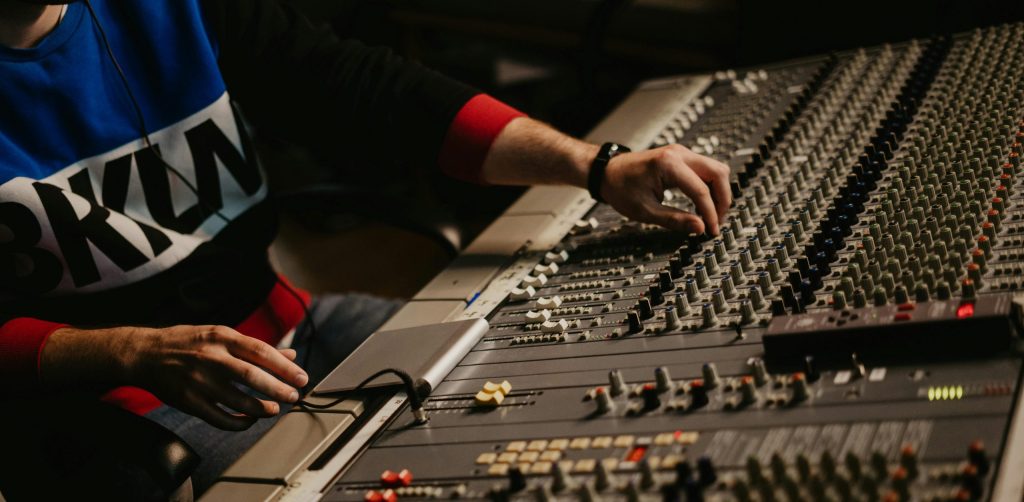Polish Your Sound: Understanding Mixing and Mastering for Professional Music Production

Ever finished recording a track and thought, “Why doesn’t this sound as polished as the music I love?”
Don’t worry—you’re not alone. The difference is all about two key steps: mixing and mastering. They’re essential processes that shape your song into something clear, balanced, and professional-sounding.
Simply put, mixing blends all your tracks together, adjusting vocals, instruments, and effects to create clarity and emotional impact. Then, mastering comes in as the final step, enhancing your track so it sounds consistent and impressive across any device—whether it’s playing through headphones, car speakers, or studio monitors.
If you’re creating and recording your own music, understanding these two processes can transform your tracks from decent demos into professional-level releases. In this article, we’ll break down exactly what mixing and mastering involve, why they’re crucial, and how they directly impact the way your listeners experience your music.
Ready to level up your sound? Let’s jump in!
Figuring Out Mixing and Mastering
Let’s get into the basics of mixing and mastering—two steps that can totally transform your music. Understanding them will let you see the artistry that goes into making tracks sound top-notch.
Mixing: Finding the Right Blend
Mixing is about turning your separate recorded tracks into a song that flows and resonates emotionally. Here’s where the transformation happens, from raw recordings to a polished masterpiece.
At its core, mixing means ironing out levels, spreading out sound (panning), and using effects on each track. The aim? A balanced, clear, and engaging audio experience.
Mixing techniques often use:
-
EQ (equalization) to shape the sound character
-
Compression to manage dynamic range
-
Reverb and delay to add depth and space
-
Balancing volumes so everything sits just right in the mix
When done well, mixing lets each sound shine on its own while still fitting perfectly in the overall song.
Mastering: That Extra Touch
Mastering is the final step, where your mixed song gets ready to sound fantastic on all kinds of listening platforms and equipment.
The process makes sure your track holds up whether it’s played on a killer sound system or a pair of everyday earbuds. Mastering pros focus on the track’s overall sound, tweaking and enhancing clarity and impact.
Key mastering techniques include:
-
Fine-tuning EQ for a smooth tonal balance across frequencies
-
Gentle compression and limiting for even levels and loudness
-
Tweaking stereo width for a captivating listening experience
-
Adjusting loudness to compete well on streaming platforms
Mastering also involves organizing tracks for an album, adding metadata, and prepping formats for various channels.
Mixing vs. Mastering: What’s the Difference?
Both mixing and mastering are essential for a really polished sound, but they play different roles in music production.
Knowing these differences helps artists see how each process elevates their music. Some folks might mix and master their tracks solo, but lots find that tapping into professional skills can really amp up the quality of what’s released.
Why Professional Sound Matters
These days, the quality of your music can seriously impact your success. So, why’s going pro with your sound so important for your music life?
Quality Shapes How People Hear Your Music
How you mix and master can hugely affect what listeners think of your music. A well-done track can wow people and get stuck in their minds.
High-quality production also helps your music get noticed. It shows you care about your craft and your listeners’ enjoyment.
Listeners tend to link crisp, clear production with serious artistic cred. This vibe can boost engagement, sharing, and maybe even your streaming stats.
A sloppy production, however, might distract from even ace songwriting. Listeners could skip your track or miss out on its potential, no matter how great the music is at its core.
Elevate Your Songs
Bringing in pros for mixing and mastering can take a good song and make it great. This magic happens through expert audio touches that bring out the best in your track.
You’ll notice:
-
Sharper clarity and separation between instruments
-
Extra layers and a richer stereo sound
-
Energy and consistency across different sound systems
-
Emotional depth that aligns with your song’s heart
Take a ballad recorded at home—it might sound alright, but lack that warm, intimate vibe. A pro mix can bring the vocals into the spotlight, add a touch of reverb for atmosphere, and balance instruments to back up, not drown out, the lead.
Mastering then makes sure this beautifully mixed track stands out on any speaker, boosting its emotional power and replay value.
Steps You Can Take
Now that you know why mixing and mastering matter, it’s action time. Here’s how to up your music production game.
Pump Up Your Production Quality
Investing in high-quality production is key to pushing forward in your music career. It’s less about splurging and more about smart spending to make the most of your music.
Here’s what you can do:
-
Hire a mixing engineer for those critical tracks
-
Use a mastering service to ensure your tunes compete well
-
Upgrade your home studio gear for better recordings
-
Join workshops or online classes to hone your production skills
Remember, every buck spent on enhancing your sound is an investment in your musical journey. Quality production can unlock new opportunities and help you build a solid fanbase.
Share this blog
Related Blogs
-
Josh Reid










